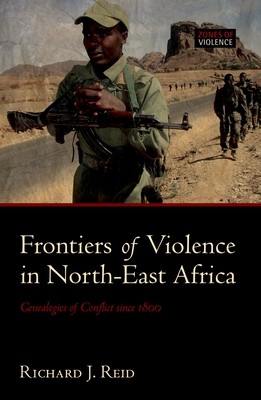
- We will send in 10–14 business days.
- Author: Richard J Reid
- Publisher: Oxford University Press, USA
- ISBN-10: 0199211884
- ISBN-13: 9780199211883
- Format: 15.5 x 23.4 x 2.8 cm, hardcover
- Language: English
- SAVE -10% with code: EXTRA
Reviews
Description
Northeast Africa has one of the richest histories in the world, and yet also one of the most violent. Richard Reid offers an historical analysis of violent conflict in northeast Africa through the nineteenth and twentieth centuries, incorporating the Ethiopian and Eritrean highlands and their escarpment and lowland peripheries, stretching between the modern Eritrean Red Sea coast and the southern and eastern borderlands of present day Ethiopia. Sudanese and Somali frontiers are also examined insofar as they can be related to ethnic, political, and religious conflict, and the violent state- and empire-building processes which have defined the region since c.1800.
Reid argues that this modern warfare is not solely the product of modern political 'failure', but rather has its roots in a network of frontier zones which are both violent and creative. Such borderlands have given rise to markedly militarised political cultures which are rooted in the violence of the nineteenth century, and which in recent decades are manifest in authoritarian systems of government. Reid thus traces the history of Amhara and Tigrayan imperialisms to the nationalist and ethnic revolutions which represented the march of volatile borderlands on the hegemonic centre. He suggests a new interpretation of Ethiopian and Eritrean history, arguing that the key to understanding the region's turbulent present lies in an appreciation of the role of the armed, and politically fertile, frontier in its deeper past.EXTRA 10 % discount with code: EXTRA
The promotion ends in 16d.00:52:18
The discount code is valid when purchasing from 10 €. Discounts do not stack.
- Author: Richard J Reid
- Publisher: Oxford University Press, USA
- ISBN-10: 0199211884
- ISBN-13: 9780199211883
- Format: 15.5 x 23.4 x 2.8 cm, hardcover
- Language: English English
Northeast Africa has one of the richest histories in the world, and yet also one of the most violent. Richard Reid offers an historical analysis of violent conflict in northeast Africa through the nineteenth and twentieth centuries, incorporating the Ethiopian and Eritrean highlands and their escarpment and lowland peripheries, stretching between the modern Eritrean Red Sea coast and the southern and eastern borderlands of present day Ethiopia. Sudanese and Somali frontiers are also examined insofar as they can be related to ethnic, political, and religious conflict, and the violent state- and empire-building processes which have defined the region since c.1800.
Reid argues that this modern warfare is not solely the product of modern political 'failure', but rather has its roots in a network of frontier zones which are both violent and creative. Such borderlands have given rise to markedly militarised political cultures which are rooted in the violence of the nineteenth century, and which in recent decades are manifest in authoritarian systems of government. Reid thus traces the history of Amhara and Tigrayan imperialisms to the nationalist and ethnic revolutions which represented the march of volatile borderlands on the hegemonic centre. He suggests a new interpretation of Ethiopian and Eritrean history, arguing that the key to understanding the region's turbulent present lies in an appreciation of the role of the armed, and politically fertile, frontier in its deeper past.

Reviews